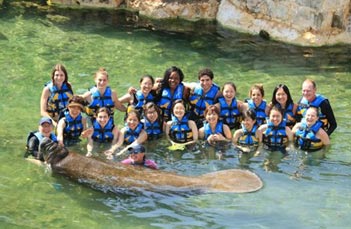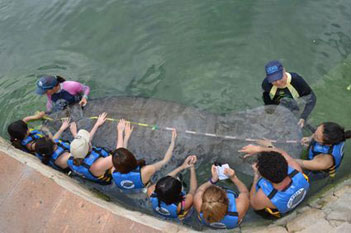Learning Comparative
Physiology and Anatomy
in Riviera Maya
A white sandy beach in Riviera Maya, Mexico. A 5 star
hotel with world class food. Beautiful tropical skies.
Marine mammals swimming leisurely in a lagoon within
a 3 minute walk. Your typical university course setting?

PSL 379 - Class of 2015 with a gentle manatee! Course instructors Carin
Wittnich (far left front row) and Jim Goltz (far right back row).
Welcome to Physiology’s PSL 379! This course, offered
through the Department of Physiology and in coordination
with the Oceanographic Environmental
Research Society (OERS), is directed and taught by Dr.
Carin Wittnich (Surgery & Physiology) with assistance
from Dr. Jim Goltz (OERS veterinarian). This unique
Physiology field course gives future doctors, physiologists,
anatomists, and ecologists the opportunity to
understand the unique physiology of 3 marine mammals
(manatee, seals and dolphins) and apply this knowledge
when comparing it to human physiology/anatomy.
What is the connection to surgery you may ask?
Numerous applications of aquatic adaptations exist
in humans and may influence how surgery may be
performed. A fetus lives in a fluid environment for 9
months but must suddenly support itself once it leaves
the womb. Surgery performed on that fetus/newborn
may need to consider these adaptations and changes that
occur after birth to better optimize outcomes. Another
example is a reflex called the Mammalian Diving Reflex
that occurs when a body is suddenly immersed in cold
water, causing the body to ‘shut down’ certain parts to
preserve itself. Hypothermia has been used in cardiopulmonary
bypass surgery for decades and is a key component
in protecting the body. Studying these adaptations
to aquatic life may lead to improving surgical outcomes.
|
During this course, students conduct their own physiology
based research as they spend time in and out of the
water observing these amazing marine mammals. The
students come away with a new appreciation of performing
research that will hopefully assist them in future
career opportunities such as surgery and medicine.

Class collecting morphometric data from a manatee. Dr. Wittnich on right
stabilizing the tail
This course was recognized with the Department of
Physiology’s award for Innovative Course Design (2012),
and the Faculty of Medicine Excellence in Undergraduate
Laboratory Teaching in Life Sciences Award (2013). Dr.
Wittnich has also won several graduate and undergraduate
awards for courses she directs or teaches.
Carin Wittnich, Professor
Department of Surgery, University of Toronto
|